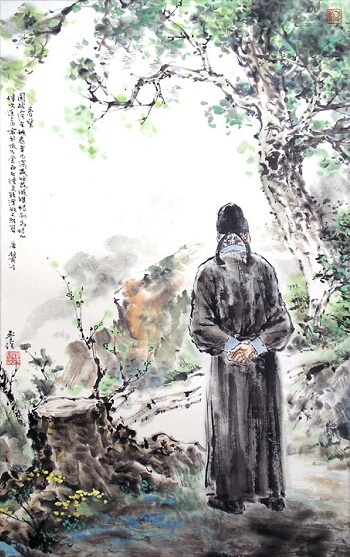A Spring View
- Poetry of Du Fu

国破山河在,城春草木深。
感时花溅泪,恨别鸟惊心。
烽火连三月,家书抵万金。
白头搔更短,浑欲不胜簪。
Though a country be sundered, hills and rivers endure;
And spring comes green again to trees and grasses
Where petals have been shed like tears
And lonely birds have sung their grief.
...After the war-fires of three months,
One message from home is worth a ton of gold.
...I stroke my white hair. It has grown too thin
To hold the hairpins any more.
Five-character-regular-verse
This poem dates from 757, when Du Fu was held captive by the rebels in Chang'an. The hairpin was used to hold in place the caps worn by Chinese officials (Owen p. 420).
Du Fu’s poetry, particularly “Gazing at Spring,” explores the heart-wrenching aspects of war on families and the natural world. In the first line, he juxtaposes the broken state of the country, 国破 (country, broken), with the flourishing grass and wood in the city. By doing so, he emphasizes the fragile and wilted state of his country. His thoughts are so turmoiled by the state of his country that even when he sees a beautiful flower or hears the chirping of birds, he imagines that the flower is shedding tears and the birds are wailing. His personification of nature evokes a distressing image of a country so devastated and torn apart that even nature mourns for it. Why is this country so broken? In the next line, Du Fu makes it clear that a war is raging throughout the country through his statement that the beacon fire (烽火), which is lighted on towers and the tops of hills to alert the soldiers of the approaching enemy, has been lighted for three months. As a cause of this war, families are torn apart; now, even a single letter from his family seems to be equal in worth to ten thousand pieces of gold. After highlighting the war’s impact on his country and nature, Du Fu depicts how the war has affected him. Because of his constant worry for his country, he has tugged and scratched at his white hair so often that he can no longer hold a hairpin in it. Thus, Du Fu uses evocative imagery to illustrate the devastating impacts of war on his nation and personal life.
- Why Chinese poems is so special?
- The most distinctive features of Chinese poetry are: concision- many poems are only four lines, and few are much longer than eight; ambiguity- number, tense and parts of speech are often undetermined, creating particularly rich interpretative possibilities; and structure- most poems follow quite strict formal patterns which have beauty in themselves as well as highlighting meaningful contrasts.
- How to read a Chinese poem?
- Like an English poem, but more so. Everything is there for a reason, so try to find that reason. Think about all the possible connotations, and be aware of the different possibilities of number and tense. Look for contrasts: within lines, between the lines of each couplet and between successive couplets. Above all, don't worry about what the poet meant- find your meaning.
List of Chinese poets
Pre-Qin Poetry
Han poetry
Ban Gu Cao Cao Cao Zhi Cao Pi Cai Wenji Kong Rong Liu Bang Liu Che Qin Jia Ruan Ji Su Wu Wang Can Xiang Yu Xu Gan Zhang Heng AnonymousSix Dynasties Poetry
Tao Yuanming Zhang HuaTang poetry
Bai Juyi Bao Junhui Cen Shen Chen Zi'ang Cui Hao Chang Jian Cui Tu Chen Tao Du Fu Du Mu Du Shenyan Dai Shulun Du Xunhe Du Qiuniang Gao Shi Gu Kuang Gao Pian Han Yu He Zhizhang Han Hong Huangfu Ran Han Wo Huang Chao Jia Dao Jiaoran Jin Changzu Li Bai (Li Po) Li He Li Shangyin Liu Yuxi Liu Zongyuan Luo Binwang Li Qi Liu Changqing Lu Lun Li Shen Li Yu Li Qiao Li Yi Liu Fangping Liu Zhongyong Li Ye Meng Haoran Meng Jiao Ma Dai Pei Di Qian Qi Quan Deyu Sikong Shu Song Zhiwen Shen Quanqi Shangguan Wan'er Xuanzong of Tang Wang Bo Wang Changling Wang Wei Wang Zhihuan Wei Yingwu Wen Tingyun Wang Han Wei Zhuang Wang Wan Xue Tao Xu Hun Xu Hui Yuan Zhen Yu Xuanji Yu Shinan Yuan Jie Zhang Jiuling Zhang Ji Zhang Hu Zhang Zhihe Zu Yong Zhang Xu Zhu Qingyu Zheng Tian Zhang Bi Zhang RuoxuSong Poetry
Cai Xiang Chao Chongzhi Fan Chengda Fan Zhongyan Huang Tingjian He Zhu Kou Zhun Jiang Kui Lu You Li Qingzhao Liu Yong Mei Yaochen Ouyang Xiu Pan Lang Qin Guan Qian Weiyan Su Shi Su Zhe Song Qi Wang Anshi Wen Tianxiang Weng Juan Xin Qiji Yang Wanli Yue Fei Yan Jidao Yan Shu Ye Shaoweng Zeng Gong Zhang Xian Zhou Bangyan Zhu Shuzhen Zhu Xi Zhou DunyiYuan poetry
Bai Pu Guan Hanqing Ma Zhiyuan Xu Zaisi Yang WeizhenMing poetry
Chen Jiru Tang Yin Tang Xianzu Xu Wei Yu Qian Yang ShenQing poetry
Cao Xueqin He Shuangqing Nalan Xingde Pu Songling Tsangyang Gyatso Wang Guowei Yuan Mei Zheng Xie Zhao Yi